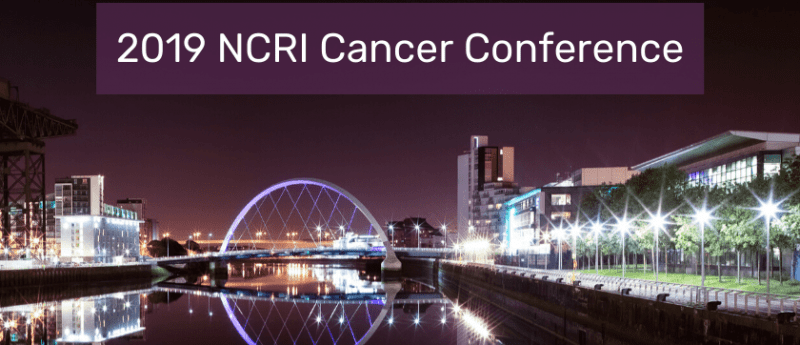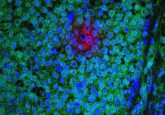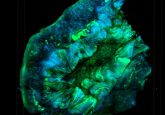Highlights from the 2019 NCRI Cancer Conference

This year the NCRI Cancer Conference (3–5 November, Glasgow, UK) celebrated its 15-year anniversary. Hundreds of delegates attended the congress, which provides an update on cancer research – covering topics from basic biology through to clinical trial data and living with and beyond cancer.
To kick things off conference co-chair Clare Isacke shared her highlights: “My personal highlights were a sobering lecture from Mark Ratain discussing how too many patients receive higher drug doses than is necessary, contributing to an increasing economic burden on the health service but an increased risk of toxicities for the patient.” This talk, which took place on the first day of the conference, explored the emerging discipline of interventional pharmcoeconomics to reduce prescribing costs.
Tying into the subject of drug access Joanne Duffy (Institute of Cancer Research, London, ICR) spoke to us about her favorite talk from the conference, which took place on the second day: “The stand-out session for me was ‘Treatable but not curable: cancer as a chronic disease’, which dealt with the huge number of patients who are living with a terminal diagnosis for a lot longer than ever before.”
“Access to cutting edge treatments means patients can often live years with a terminal diagnosis, which presents a huge degree of uncertainty for them and their families. Hearing from Paul Cosford, the Medical Director of Public Health England, about his experience living with terminal lung cancer was incredibly moving and mind-opening,” Duffy added.
Another session that stood out from the second day was based around assisted dying and whether it could become a part of cancer care in Britain. The open debate chaired by Sam Ahmedzai (NCRI) provided a 360 perspective on the topic with the panel comprising a patient representative, palliative care physician, ethicist and a member of the House of Lords. Questions raised from the session included whether a change in law is required to allow patients to make their own decisions about their care.
On the final day of the congress a talk by Kate Brain (Cardiff University, Wales) stood out to our Senior Editor. Kate Brain outlined the key elements needed for change in optimizing recognition and referral across the patient pathway. Three ingredients highlighted were capability, motivation and opportunity – thereby ensuring patients know what the symptoms are, believe that seeking help is beneficial and that they have access to these services from trusted providers. Public awareness campaigns have been instrumental in changing attitudes and behaviours, however, Brain emphasized that these must now be funded and evaluated long term.
As noted from the talks mentioned above, patient perspectives was a key theme running throughout the conference. Wellbeing of delegates was also focused on during the conference with activities ranging from early morning jobs, to colouring and mindfulness sessions as well as step challenges. Tying these two themes together was the art exhibition that featured artistic expressions of a cancer journey created by patients.
Looking back on the final day of the conference Clare Isacke commented: “…We had a stunning lecture from Gillian Griffiths (University of Cambridge, UK) showing at the subcellular level how cytotoxic T cells engage with tumour cells prior to releasing their lethal payloads, providing key information as to how the T cell killing might be manipulated therapeutically.”
“What came through loud and clear was both the opportunities and challenges presented in this era of big data and were given many examples of how it can be used to provide more accurate diagnosis and tracking of disease but also highlighting the issues of how we best harness this data for patient benefit while tackling the challenges of who storage, sharing and ownership. An area where patient involvement is critical,” conference co chair Isacke shared.
Alan Parker (Cardiff University, UK) also selected the talk from Gillian Griffiths and as well as one from Amato Giaccia (University of Oxford, UK) as being of special interest.
“Immunotherapies are revolutionizing the way cancers are treated, and largely this has been considered to be an effect mediated by the recruitment and activation of effector T cells within the tumour. Griffiths’s beautiful presentation elegantly demonstrated the mechanism by which activated CD8+ T-cells kill cancer cells, and the critical role played by the centriole in delivering the “killer blow” at the synapse between the T-cell and the tumour cell. Giacca’s talk, on the other hand pointed to a key role for a different type of immune cell, the natural killer (NK) cell in mediating response to immunotherapy. His talk highlighted the potential that strategies to increase infiltration of NK cells to tumours might have in patients undergoing treatment for advanced cancers,” Parker noted.
All in all the conference was a great forum to meet and discuss pressing topics in the field with patients, scientists, health care providers, carers, health economists and we cant wait to attend the conference next year in Belfast! In the meantime, find news headlines from the conference below:
Blood test could detect breast cancer before clinical signs
Ovarian cancer detected with CA125 blood test
Non-invasive test for detecting cervical pre-cancer developed
Artificial intelligence may speed up brain tumor diagnosis, research suggests
Risk of prostate cancer influenced by levels of two circulating hormones





